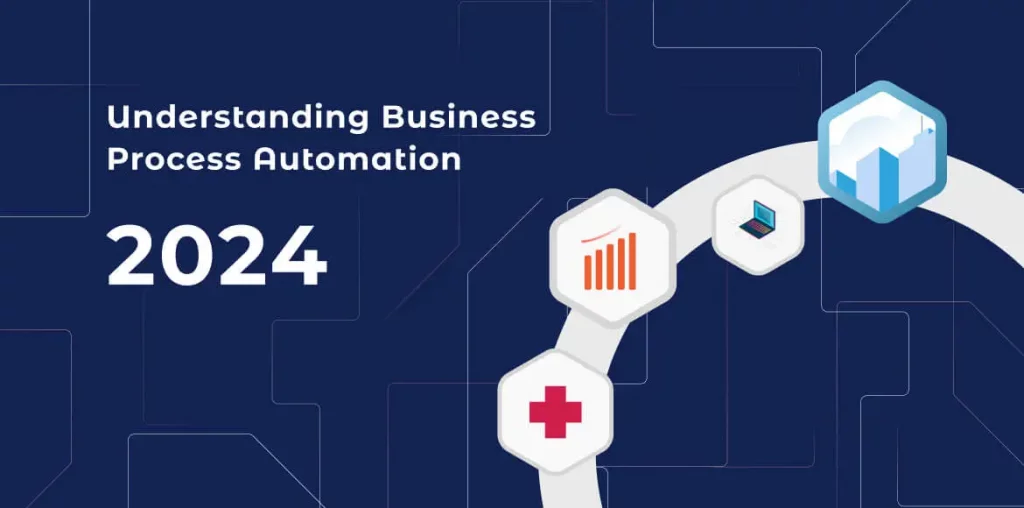Contents
As the calendar flips to 2024, Business Process Automation (BPA) transcends beyond being a mere trend to become a strategic cornerstone for companies poised to sustain and enhance their competitive edge. The strategic integration of automation software and tools is revolutionizing how companies operate, heralding a new era of heightened efficiency and robust growth.
Understanding Business Process Automation
At its core, Business Process Automation harnesses the prowess of advanced technology to execute repetitive tasks, spanning the spectrum from straightforward data entry to the intricacies involved in Robotic Process Automation (RPA). This paradigm shift not only optimizes operations by eliminating redundancy but crucially reallocates human resources towards endeavors of strategic importance.

12 Benefits of Automating Processes Within Your Business or Organization
The adoption of BPA brings manifold benefits that collectively drive the engine of modern businesses toward achieving operational excellence:
1. Surge in Efficiency and Productivity
Automation tools assume control over manual tasks, redirecting human talent towards more value-adding activities, thereby elevating overall productivity and operational efficiency. This transition not only streamlines workflows but also significantly reduces the time and resources spent on routine operations. According to a report by Deloitte, businesses implementing automation have observed up to a 30% increase in speed and efficiency for processes previously handled manually. Furthermore, automation’s capability to work around the clock without fatigue or downtimes ensures that productivity is not just maintained but optimized, allowing businesses to achieve more with less and paving the way for innovation and growth.



2. Cost Reduction
Automating processes significantly reduces operational costs by minimizing the errors and inefficiencies associated with manual handling. This not only reduces the direct cost of labor but also the cost of correcting errors and process inefficiencies.
An IBM study shows that automation can help reduce processing costs by as much as 80% in some cases, especially in areas such as customer service and financial transaction processing. In addition, the scalability of automated systems means that companies can handle increased workloads without a corresponding increase in costs, resulting in significant long-term savings.
3. Heightened Accuracy and Minimized Errors
Automated systems ensure accuracy in tasks such as data entry, greatly reducing the incidence of human error. By leveraging precise algorithms and sophisticated data processing technologies, these systems virtually eliminate the risk of mistakes that can lead to financial discrepancies and customer dissatisfaction. This precision is crucial in industries where errors can have significant consequences, such as healthcare and finance.
For example, in financial services, automation can reduce transaction errors by up to 66%, according to a study by the Aberdeen Group, showcasing the direct impact of automation on enhancing operational reliability and building trust with customers.
4. Boosted Customer Satisfaction
Automation solutions ensure that customer interactions are consistent and timely, which has a direct impact on customer satisfaction. By automating customer service processes, such as ticketing systems and chatbots, companies can provide 24/7 support, reducing wait times and improving the overall customer experience. This constant availability and rapid response rate meet the modern consumer’s expectations for immediate and effective assistance, significantly increasing customer loyalty and retention. In addition, the personalized communications enabled by automation can lead to a more tailored customer experience, further increasing satisfaction.
Salesforce reports that 84% of customers say a company’s experience is as important as its products and services, underscoring the value of automation in customer service strategies.
5. Scalability of Processes
Designed to grow with your business, BPA solutions provide scalable options for expanding operations without a linear increase in headcount. The inherent flexibility of automation makes it easy to scale business operations to accommodate peak periods, market expansion, or the introduction of new products or services without significantly increasing staff or infrastructure. This scalability ensures that businesses can quickly adapt to changes in demand while maintaining high levels of service and efficiency. For example, cloud-based automation tools can be scaled up or down with minimal effort, allowing businesses to effectively manage costs while still capitalizing on growth opportunities.
As highlighted by Gartner, the scalability offered by automation is a key factor in enabling businesses to remain agile and responsive in a rapidly changing market landscape, positioning them for long-term success and sustainability.
6. Enhanced Compliance and Security
Features such as audit trails and verified user access ensure that automated processes comply with regulatory standards and are secure against data breaches. Automation plays a critical role in enforcing compliance policies consistently across all operations, significantly reducing the risk of violations that can lead to costly fines and reputational damage.
For example, in highly regulated industries such as finance and healthcare, automated systems can be programmed to adhere to the latest compliance requirements, ensuring that all transactions and data handling meet strict regulatory criteria. In addition, by automating the management of user privileges and access controls, organizations can improve their data security posture and protect sensitive information from unauthorized access. Encryption and secure data transfer methods further strengthen this security, making automation a key ally in the fight against cyber threats.
According to an IBM report, companies that fully implement automation in their data protection strategies experience a 60% reduction in data breach costs, illustrating the significant impact of automation in improving compliance and security measures.
7. Empowered Data-Driven Decision Making
Customizable dashboards and analytics offer insights into operations, helping organizations make informed decisions. By leveraging automation, businesses can collect, analyze, and visualize large amounts of data in real time. This enables leaders to identify trends, forecast outcomes, and make strategic decisions with greater accuracy.
This data-driven approach enables resource optimization, improved risk management, and the discovery of new opportunities for innovation and growth. For example, automated analytics tools can identify inefficiencies in a supply chain, suggest areas for cost reduction, or reveal customer behavior patterns that inform marketing strategies. Forbes reports that companies that use data-driven decision-making can experience up to a 6% increase in profitability. This highlights the significant impact of automation on strategic planning and competitive advantage.



8. Elevated Employee Satisfaction
Removing mundane tasks from employees’ workloads improves job satisfaction and allows them to focus on more engaging and rewarding work. Automation eliminates tedious, repetitive tasks and empowers employees with tools that enhance their productivity and creativity.
This shift towards more meaningful work can significantly boost morale, reduce burnout, and foster a culture of innovation and continuous improvement. Furthermore, employees who believe their skills are being utilized in more strategic areas will likely exhibit higher engagement and loyalty to the company.
A report by Gallup indicates that engaged employees contribute to 21% greater profitability for their companies, emphasizing the direct correlation between employee satisfaction, engagement, and organizational performance. By investing in automation, companies optimize their processes and invest in their most valuable asset: their people.
9. Operational Transparency
BPA tools offer insight into business operations, identifying inefficiencies and optimizing processes for improved performance. This transparency is crucial for managers and leaders to make informed decisions quickly. With real-time data available, organizations can monitor workflows, track progress, and identify bottlenecks or areas that require attention.
This level of insight enables proactive operations management, allowing for real-time adjustments and improvements. For example, an automated inventory management system can alert you when stock levels are low, preventing potential sales losses due to out-of-stock items. Additionally, operational visibility ensures accountability by tracking and recording tasks and processes, making it easier to evaluate performance against benchmarks and KPIs.
According to a study by the Aberdeen Group, companies that use BPA for operational visibility can achieve up to a 55% faster response time to market changes. This underscores the strategic advantage of leveraging automation for enhanced operational oversight.
10. Accelerated Time to Market
Streamlined operations via BPA can help companies speed up product development cycles and achieve faster time-to-market. By automating key stages of production and distribution processes, businesses can significantly reduce lead times associated with launching new products or services. This acceleration is especially beneficial in industries where innovation speed is critical to staying ahead of competitors.
Automation ensures that tasks such as testing, quality checks, and regulatory compliance are completed more efficiently without sacrificing accuracy or quality. For example, software companies use automated testing tools to quickly identify and resolve bugs, allowing for rapid iterations and updates. This not only improves the product but also shortens the development lifecycle, enhancing the company’s ability to respond to market demands and technological advancements.
A report by Capgemini shows that companies that implement automation in their go-to-market strategies experience a 20% reduction in time to market. This illustrates the direct impact of automation on competitive agility and customer satisfaction.
11. Secured Competitive Advantage
Companies utilizing BPA are better equipped to respond to market changes and maintain a competitive edge. In today’s fast-paced business environment, the ability to quickly and efficiently adapt to new opportunities or threats is a key factor in achieving success. Automation provides the agility needed to pivot operations, customize offerings, and meet customer demands in real-time. Furthermore, automated systems can generate data insights that inform strategic decisions, enabling businesses to anticipate market trends and innovate ahead of their competitors.
This strategic foresight, combined with the operational benefits of automation, such as cost savings, enhanced productivity, and improved customer satisfaction, creates a formidable competitive edge. For example, businesses that use automation in their supply chains can ensure faster delivery times, which enhances customer experience and loyalty.
According to the Boston Consulting Group, companies that integrate digital technologies, such as automation, into their operations can achieve cost reductions of up to 30% and revenue increases of up to 20%. This underscores the significant impact of BPA on maintaining and enhancing competitive positioning in the market.
12. Promotion of Environmental Sustainability
Encourage full departmental automation with RPA to reduce reliance on paper-based processes and optimize resource use, contributing to an organization’s sustainability goals. Automation plays a pivotal role in promoting environmental stewardship by streamlining operations and reducing waste. Digital workflows and electronic records not only minimize the need for physical storage but also decrease paper consumption, which is a major environmental concern. Additionally, automation can optimize energy usage across various business operations, from manufacturing to office environments, by ensuring that resources are used efficiently and only when necessary.
Automated systems not only improve operational efficiencies but also aid in managing a company’s environmental impact by tracking and analyzing sustainability metrics. This allows businesses to make informed decisions that support eco-friendly practices and compliance with environmental regulations. For instance, an automated energy management system can significantly reduce a company’s carbon footprint by adjusting energy consumption based on real-time data.
According to a study by the Environmental Protection Agency (EPA), businesses that implement automation in energy management can reduce energy use by up to 30%. This highlights the significant role of automation in advancing environmental sustainability efforts.
Implementing Automation in Your Business
Embarking on the automation journey mandates a strategic blueprint. It begins with a meticulous analysis of business processes to identify tasks ripe for automation. A comprehensive assessment of automation solutions must follow, ensuring seamless integration with existing systems while upholding the highest quality assurance standards.
To sum up
As 2024 unfolds, the imperative for Business Process Automation (BPA) in achieving unparalleled operational efficiency and securing a competitive market position has never been more pronounced. The integration of BPA transcends a mere operational upgrade; it embodies a strategic pivot essential for businesses striving for growth, efficiency, and a sustainable competitive edge. The spectrum of benefits from adopting such automation—ranging from significant cost reductions to improved productivity and a robust competitive stance—underscores the transformative potential of BPA in today’s digital era.
In the dynamic realm of digital transformation, leveraging BPA is not just about enhancing operational efficiency; it’s a strategic move toward ensuring your business remains relevant, agile, and capable of embracing the opportunities and challenges of the future.
At Scimus, we specialize in crafting tailored Business Process Automation solutions designed to address your unique business challenges. Our expert team is dedicated to empowering your enterprise with cutting-edge automation strategies that streamline operations, enhance productivity, and drive growth. Whether you’re looking to mitigate inefficiencies, harness the power of data for informed decision-making, or secure your competitive advantage in the marketplace, we’re here to guide you every step of the way.
Embrace the future of business operations with Scimus. Our comprehensive suite of BPA services is crafted to unlock the full potential of your business, ensuring you’re well-equipped to navigate the complexities of 2024 and beyond. Let us partner with you to transform your operational landscape and address your business process automation challenges head-on.

